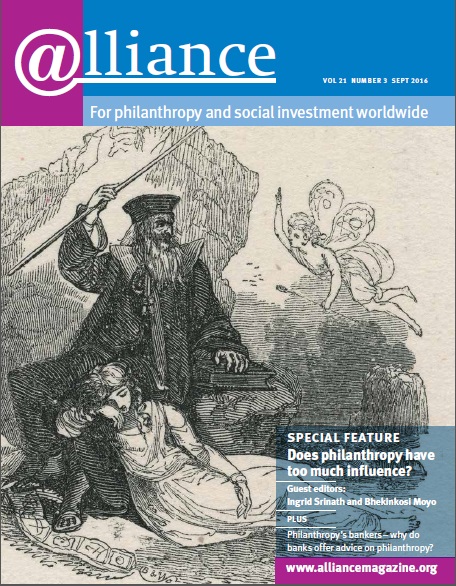In September 2011, Alliance devoted its special feature to the rise of the Gates Foundation. That feature was controversial. It highlighted concerns about the disproportionate power exercised by the foundation through its large size and limited accountability. Longstanding readers may also recall the not-so-subtle image of an 800-pound gorilla on the front cover.
Five years on, it is not only the Gates Foundation that has grown in size and influence. Philanthropy itself is now centre stage. The art of philanthropy is complex – at times deft and subtle, at others forceful and muscular – something reflected in Shakespeare’s Prospero on the cover of this issue: staff in one hand, book in the other and angel aloft, proclaiming ‘I have done nothing but in care of thee’.
Philanthropy’s capacity to influence society has arguably never been greater or more sought after. Governments see in philanthropy a flexible source of capital and expertise and opportunities for public-private partnership. Philanthropy sees in government the opportunity to shape public policy, bring ideas to scale and seek recognition for its partners and, in some cases, for itself. Meanwhile, civil society relies on philanthropic funding to give it the freedom to challenge orthodoxy. Businesses, rhetorically at least, seek to position themselves as philanthropic and attuned to the needs of communities.
This issue of Alliance looks at the rise of philanthropic influence. In recent years, foundations have used their resources to effect change on diverse issues, some of which we spotlight. This is a cause for satisfaction to those who see philanthropic impact as a holy grail (and to those who are sympathetic to the changes achieved). Moreover, to guest editors Ingrid Srinath and Bhekinkosi Moyo in India and South Africa, philanthropy is an underused commodity. They paint a picture of hopes that far more wealthy citizens will not only contribute their wealth but do so in a way that shares power with beneficiaries and civil society.
But should countries with emerging philanthropic capacity be careful what they wish for? Could something that seems desirable today become a source of harm in the future? As Indian philanthropist Rohini Nilekani puts it: ‘What I’m nervous about is when the super-wealthy have too much influence when it comes to government decision-making.’
Of course, that influence is not exercised only through philanthropy, but philanthropy is a new frontier for exerting influence. Such influence depends on philanthropy’s freedom to operate, which in turn rests on the disposition of government and citizens. Alliance debates how ‘free’ philanthropy ought to be and how it should be managed and regulated.
This edition was only possible thanks to the support of longstanding colleague and former editor Caroline Hartnell, who provided cover and counsel at critical moments. Any errors, though, are mine alone.
Charles Keidan is editor at Alliance.






Comments (0)